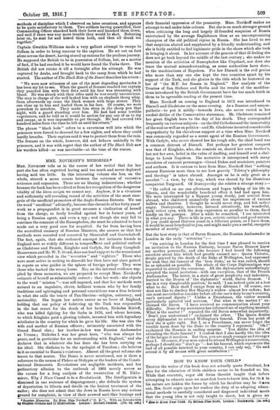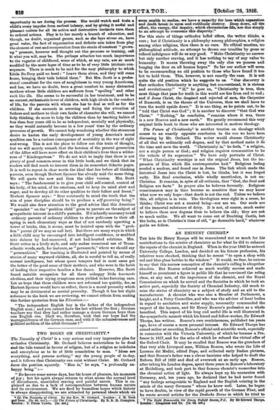HOW TO KNOW YOUR CHILD.* Tnoron the writer of this
book does not actually quote Pestalozzi, het plan for the education of little children seems to be founded on his. While that eccentric, eager old Swiss theorist taught that before attempting to educate man we must first learn to know him, for thet in his nature are hidden the forces by which his faculties may be drawn out, Mrs. Scott urges upon her readers the duty of so adapting educa- tional methods to carefully considered and diagnosed individual needs that the young idea is not only taught to shoot, but is given no
• How to Snow Your MIL By Miriam Boa Boat. London : Duckworth. Os. nohl opportunity to err during the prooess. She would match and train a child's every impulse from earliest infancy, and bygivieg it useful and pleasant outlets for all Its active and destruothas "instincts -turn them to ordered actions. Play is to her merely a branch of education, and 'though, no doubt, organized games, such as she days etress on, have great value, the fact of organization and definite aim takes from play the element of rest and recuperation from the strain of constant grown- up " pressure, however well thought out this resew° or training, nail it what you will, may be. She perhaps attaches too much importance to the vagaries of childhood, some of which, at any rate, are tio much modified by the mere lapse of time as to be of very little intrinsic-con- sequence. There is much to be said for the easy philosophy to which Little Bo-Peop paid no heed " Leave them alone, and they will oome tome, bringing their tails behind them." Bat Mrs. Scott is a profes- sional consultant for the cure of naughtiness in very young Americans, and has, we have no doubt, been a great comfort to many distracted mothers whose little children are sufferers from " spoiling" and other such like ills. She seems to be successful in her treatment, and to be an earnest, enthusiastic lover of children, with high ideals in the conduct of life, for the parents with whom she has to deal as well as for the children. If she succeeds in arresting and fixing the attention of lathers and mothers to their own faults of character she will, we _cannot help thinking, do more to help the children than by teaching babies of less than four years old to be as independent, mentally and physically, as they would naturally become in a few years' time by the ordinary -processes of growth. We cannot help wondering whether this strenuous desire to hasten the early developement of young America's moral qualities can be a curious consequence of neutrality in the war of right end wrong. This is not the place to follow out this train of thought, but we will merely remark that the heroism of the present generation of the Allies will have more effect on their children's lives than a wilder- ness of " Kindergartens." We do not wish to imply that there is not plenty of good common-sense in this little book, and we think that its readers will find much to interest them in its somewhat didactic pages. It is well to repeat in clear words the ideal that lies before all thinking parents, even though Herbert Spencer'has already said the same thing. We will quote the new and then the older version. Mrs. Scott says : " The fundamental is to give your child self-control, control of his body, of his mind, of his emotions, and to keep its mind alert and eager, and to develop all its other qualities to thoir fullest and freest." Herbert Spencer says : " Bear constantly in mind the truth that the aim of your discipline should be to produce a self-governing being." We would also draw attention to the good advice that this American " specialist" on the " problem child" gives to parents on the subject of sympathetic interest in a child's pursuits. If it is hardly necessary to tell ordinary parents of ordinary children to show politeness to their off- spring in such elementary ways as that of not carelessly upsetting a tower of bricks, this, it seems, must be insisted upon with the "prob- lem" parent (if we may so call her). But there are many ways in which a little child may bo encouraged into intelligent confidence, or snubbed into dulness by bad-mannerod, if not bad-hearted relations. Mrs. Scott writes in a lively style, and only makes occasional use of Trans- atlantic words, such, for instance, as " personnels," where we should say " personalities." Her teaching is illustrated and pointed by means of stories of many wayward children, all, she is careful to'tell us, of really normal intelligence, but whose queer tempers had in most oases got the better of the good sense of their mothers, and who were in the habit of leading their respective families a fine dance. However, Mrs. Scott found suitable occupation for all these unhappy little tourments ehretiens, and their trying symptoms soon yielded to her fostering care. Let us hope that these children were not reformed too quickly, for, as Herbert Spencer -would have us reflect, there is a moral precocity which may be as detrimental as mental precocity. Though it has but slight ,reference to the book we are reviewing, we cannot refrain from making this further quotation from his Education:— " The independent English boy is the father of the independent English man ; and you cannot have the last without the first ; German teachers say that they had rather manage a dozen German boys than one English one. Shall we, therefore, wish that our boys had the -manageableness of the German ones, and with it the submissiveness and ;political serfdom of the adult Germans Y "



































 Previous page
Previous page